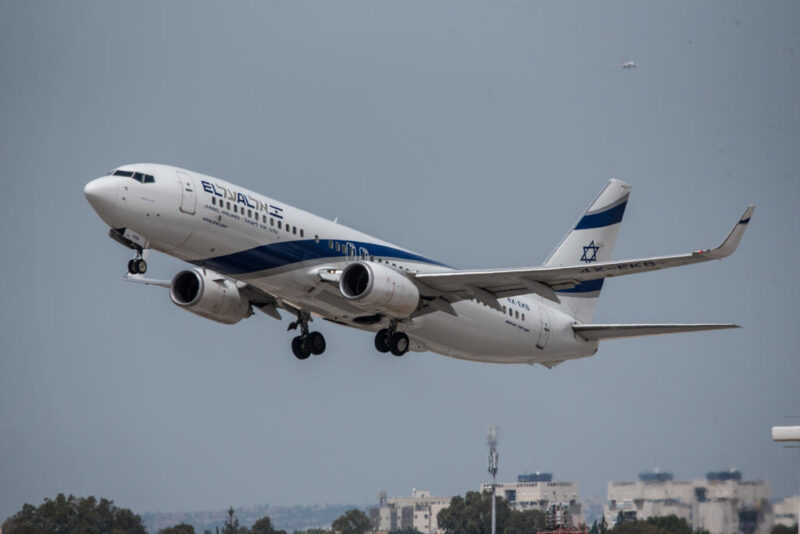
The Israeli embassy has attempted to resolve the issue with the French Foreign Ministry, but to date France has not renewed El Al security team visas.
By Babak Taghvaee, Middle East Forum
On August 7, 2025, a group of pro-Palestinian activists vandalized the Paris office of El Al, Israel’s national airline.
They smeared the entrance with red paint and scrawled anti-Israel graffiti, including slogans such as “El Al genocide airline” and “Free Palestine.”
Days later, the French government quietly halted the renewal of work visas for El Al’s Israeli security staff. These two developments highlight the growing risks that travelers to and from Israel face in France because of deliberate French policy.
El Al is unique among global airlines in that it relies on its own security personnel abroad, rather than local staff, to safeguard passengers.
This system has prevented numerous terror attacks since the 1970s. By blocking visas for these teams, the French government has effectively crippled El Al’s ability to operate at its normal security standard in one of Europe’s busiest hubs.
The suspension is alarming given the rise in anti-Israel agitation across France, much of it tolerated, if not encouraged, by French officials.
President Emmanuel Macron’s government justified its move by citing complaints from French diplomats subjected to what they called “systematic screening” by El Al security personnel at Charles de Gaulle Airport.
Yet these procedures are precisely what has allowed El Al to protect Israelis and foreign passengers from hijackings and suicide bombings.
To weaken them under the pretense of avoiding diplomatic inconvenience is to privilege bureaucratic comfort over human life.
The Israeli embassy has attempted to resolve the issue with the French Foreign Ministry, but to date France has not renewed El Al security team visas.
The French move against El Al comes amidst a broader pattern of hostility. Four months earlier, Israel denied visas for twenty-seven French lawmakers from the Communist and Green parties who planned to visit Jerusalem and Ramallah.
Israeli authorities cited their support for initiatives that undermine Israel’s security, including campaigns to recognize a Palestinian state.
The Macron administration reacted with outrage, vowing consequences. Days later, Macron himself announced that France would seek formal recognition of a Palestinian state.
The suspension of El Al’s security visas, combined with the incitement that led to the August 7 attack, shows those consequences now unfold.
France’s trajectory is shaped by two factors. First, Paris has cultivated close ties with Qatar, Hamas’s principal financial sponsor, which invests heavily in the French economy.
Second, Macron faces the reality of millions of radicalized Muslims within France’s borders. Fear of domestic unrest likely drives him toward policies that appease Islamist demands.
The security consequences are immediate. Tens of thousands of Israelis travel through Paris each year. Without credentialed security staff, El Al’s risk profile rises.
The attack on its Paris office was not symbolic; it was a warning.
Only days later, a French air traffic controller broadcast “Free Palestine” over the radio to an El Al flight approaching Charles de Gaulle, a reckless act that could have endangered lives.
Alongside Israel, the United States should not allow these provocations to pass unanswered. Jerusalem can impose targeted costs on Paris by suspending cooperation on critical defense technology.
One option would be for Elbit Systems to withhold maintenance and support for the C-MUSIC missile-defense system installed on Macron’s presidential Airbus A330, which protects it from surface-to-air and air-to-air missile threats.
For Washington, limiting Macron’s access to U.S. airports aboard the same aircraft and also Falcon 7Xs—especially during the Eightieth United Nations General Assembly on September 9, 2025—would send a clear message that endangering Israeli lives has diplomatic consequences.
El Al might also suspend direct flights between Paris and Tel Aviv, and limit Air France flights to Israel.
Ultimately, France’s suspension of El Al’s security visas and tolerance of anti-Israel attacks reveal a government more concerned with appeasing Hamas’s patrons and France’s own radicals than ensuring aviation safety.
The post Paris sides with extremists, endangers Israeli travelers appeared first on World Israel News.